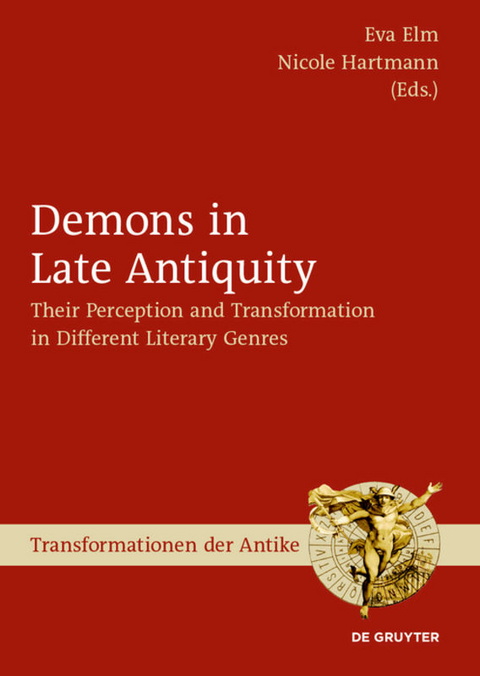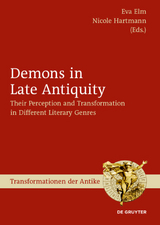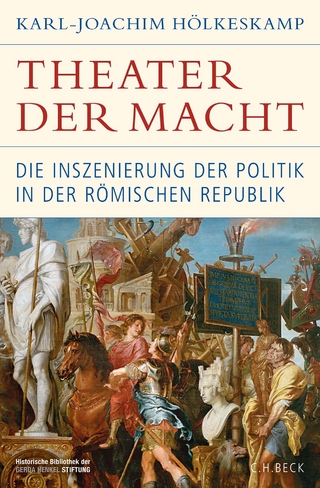Demons in Late Antiquity
Their Perception and Transformation in Different Literary Genres
Seiten
Die Antike und ihre Rezeption wurden bisher weitgehend in den Grenzen von Fachdisziplinen erforscht. In der Reihe Transformationen der Antike steht dagegen die interdisziplinäre Kontextualisierung der produktiven Transformationen antiker Wissenschaften und Künste im Vordergrund. Dargestellt wird der langwellige, von der Spätantike bis zur Moderne reichende Prozess der Herausbildung des Wissenschaftssystems der Kunstgattungen und der kulturellen Selbstkonstruktion der europäischen Gesellschaften. Die Reihe geht hervor aus dem Sonderforschungsbereich „Transformationen der Antike“ und dem „August Boeckh-Antikezentrum“ an der Humboldt-Universität zu Berlin. Ihre Projekte untersuchen Transformationsprozesse insbesondere auf drei Ebenen: die konstitutiven Funktionen der Antike bei der Ausbildung der europäischen Wissenschaftsgesellschaft und ihrer Disziplinen; die Rolle der Antike bei der Entstehung mittelalterlicher, neuzeitlicher und moderner kultureller Identitäten; sowie die künstlerischen, literarischen, übersetzerischen und medialen Formen von Rezeption und Transformation.
Since the perception of demons in antiquity depended on particular cultural and religious milieus, the authors in this volume take into view various texts – ranging from amulets, spells, apocalypses, martyrdom literature to hagiography – and focus specifically on literary aspects of the transformation of demons and their contextualization. Are specific conceptions of demons characteristic for a certain genre or, rather, for particular religious contexts, so that they appear as topoi independent of genre? Do certain representations of demons prevail in pagan, Jewish and Christian circles alike, irrespective of religious background? How do notions of demons function in apocalypses, hymns, hagiographies or texts from healing procedures and what interdependencies of genre and social context can be traced? These questions are analysed from diverse disciplinary perspectives that offer some fresh and surprising answers.
Since the perception of demons in antiquity depended on particular cultural and religious milieus, the authors in this volume take into view various texts – ranging from amulets, spells, apocalypses, martyrdom literature to hagiography – and focus specifically on literary aspects of the transformation of demons and their contextualization. Are specific conceptions of demons characteristic for a certain genre or, rather, for particular religious contexts, so that they appear as topoi independent of genre? Do certain representations of demons prevail in pagan, Jewish and Christian circles alike, irrespective of religious background? How do notions of demons function in apocalypses, hymns, hagiographies or texts from healing procedures and what interdependencies of genre and social context can be traced? These questions are analysed from diverse disciplinary perspectives that offer some fresh and surprising answers.
Eva Elm and Nicole Hartmann, Humboldt University of Berlin, Germany.
| Erscheinungsdatum | 24.01.2020 |
|---|---|
| Reihe/Serie | Transformationen der Antike ; 54 |
| Zusatzinfo | 5 col. ill. |
| Verlagsort | Berlin/Boston |
| Sprache | englisch |
| Maße | 170 x 240 mm |
| Gewicht | 455 g |
| Themenwelt | Geschichte ► Allgemeine Geschichte ► Altertum / Antike |
| Geisteswissenschaften ► Sprach- / Literaturwissenschaft ► Literaturwissenschaft | |
| Schlagworte | Antike /Rezeption • Dämonologie • Demonology • Demons • Late Antiquity • Religionswissenschaft • Transformation |
| ISBN-10 | 3-11-062672-1 / 3110626721 |
| ISBN-13 | 978-3-11-062672-8 / 9783110626728 |
| Zustand | Neuware |
| Haben Sie eine Frage zum Produkt? |
Mehr entdecken
aus dem Bereich
aus dem Bereich
die Inszenierung der Politik in der römischen Republik
Buch | Hardcover (2023)
C.H.Beck (Verlag)
CHF 67,20
Buch | Hardcover (2024)
Klett-Cotta (Verlag)
CHF 69,95




